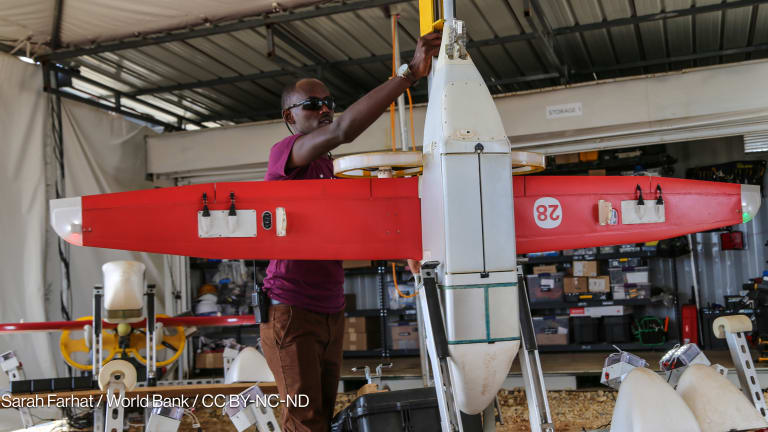The last few months have seen a dramatic reduction in official development assistance, or ODA, after years in which aid spending has grown in real terms. The Organisation for Economic Co-operation and Development estimates show that in 2025, ODA could fall by up to 17% of 2024 spending, or around $35 billion, with further cuts possible in 2026. How has the drop in ODA been received? So far, the impact of sudden U.S. cuts has already been dramatic, said Patrick Fine, former chief executive of FHI 360, a major U.S. INGO, at a recent Devex event which looked at the likely consequences of a reduction, whether ODA may recover, and what the future of development funding may look like. Fine said that on top of the immediate and harmful results of the sudden loss of ODA, other types of funding — such as foreign direct investment and remittances — may also be hit as part of a contagion that began with the U.S. aid cuts. However, Degan Ali, executive director of Kenyan nonprofit Adeso, suggested that while ODA had saved many lives, it was not universally popular in low- and middle-income countries. “I found it so interesting seeing the LinkedIn responses and the feedback and the conversations that were happening in the global north and the global south, and particularly in Africa,” she said. “They were just dramatically different.” In the global north, she said, there was widespread shock, whereas many Africans took a different view. “What I was seeing, particularly on African Twitter, or X, was ‘Finally, I'm glad, because the system was corrupt or was not doing what it was supposed to, and maybe we can finally be rid of this soft power and all of these things,’” she said. Ali said she believed that ODA is likely to continue to decline, due to political choices in Europe and the United States. “I think a lot of people are uncomfortable with the changing realities, and they want the situation to stay the same way, and they don’t want to hear the truth of how problematic ODA is,” she said. “ODA is, in my opinion, on a very fast path to death.” Fine acknowledged that there were limitations to the current aid models, but said that some kind of concessional finance was required. “Without any kind of external finance going into, or without some concessional finance going to low-income countries, we’re going to see a lot of harm, a lot of human suffering,” he said. “You will see governments and countries that are not able to meet the needs of their people with the resources they’re able to generate locally.” Is ODA the right tool to fund development any more? Ali said ODA was part of a post-World War II settlement that offered “quasi-independence” without economic freedom. “I think the next 60 years will be dramatically different from the last 60 years. I think we are going to see more and more power in the hands of the global south, and more and more rejection of things like ODA, unless it’s on our terms,” she said. She said that rather than ODA, she wanted to see different forms of finance — such as direct budget support and long-term lending for infrastructure, rather than short term projects. And she would like to see more equitable funding of trade. Ali said she felt that countries in the global north had surrendered moral authority following some of their recent actions, and that partly as a result of that, international NGOs and United Nations agencies based in those countries might become increasingly unwelcome. Fine said he agreed with many of the points Ali put forward, but he was not convinced that the current global political environment would produce the changes Ali was looking for. “What I see right now is a world that has not just wealthy countries but many countries around the world that are more self-absorbed, self-centered,” he said. “They’re less compassionate, caring less about what happens. And this idea of being part of an international community and being good neighbors in that community has lost some of its force. “And particularly the powerful countries, whether it’s India or the U.S., or countries in Europe, or China, see the world from a mercantilist point of view, where might makes right, and we're competing in a zero-sum game, and that doesn’t create the basis for that kind of vision that that you were saying — a fairer, more equitable international order.”
The last few months have seen a dramatic reduction in official development assistance, or ODA, after years in which aid spending has grown in real terms.
The Organisation for Economic Co-operation and Development estimates show that in 2025, ODA could fall by up to 17% of 2024 spending, or around $35 billion, with further cuts possible in 2026.
How has the drop in ODA been received?
This story is forDevex Promembers
Unlock this story now with a 15-day free trial of Devex Pro.
With a Devex Pro subscription you'll get access to deeper analysis and exclusive insights from our reporters and analysts.
Start my free trialRequest a group subscriptionAlready a user? Sign in
Printing articles to share with others is a breach of our terms and conditions and copyright policy. Please use the sharing options on the left side of the article. Devex Pro members may share up to 10 articles per month using the Pro share tool ( ).
Search for articles
Most Read
- 1
- 2
- 3
- 4
- 5








